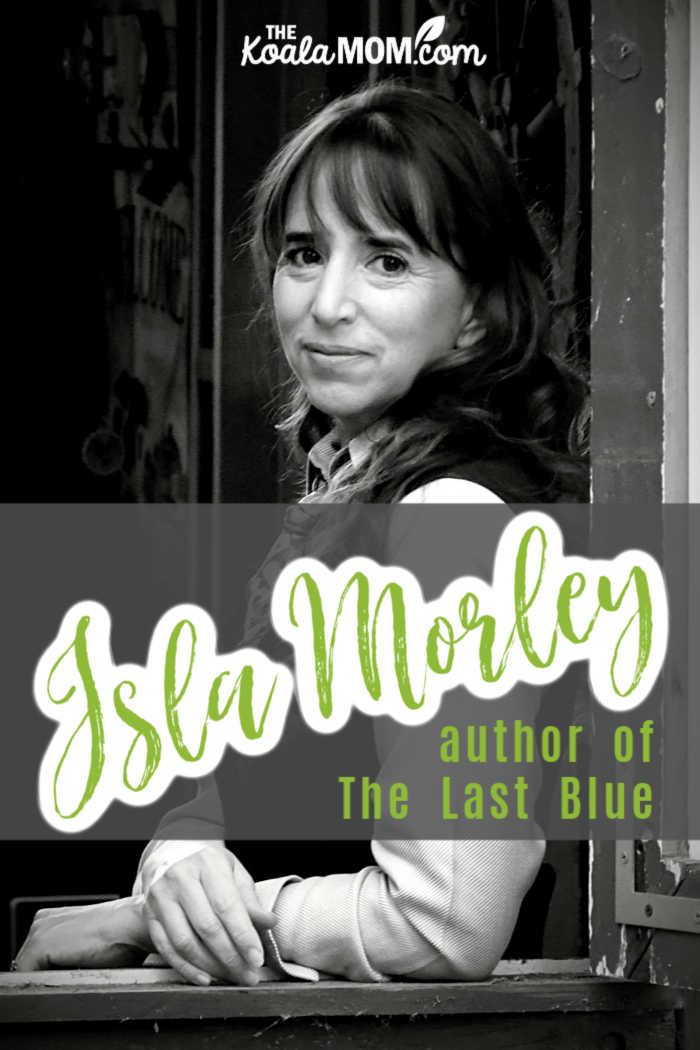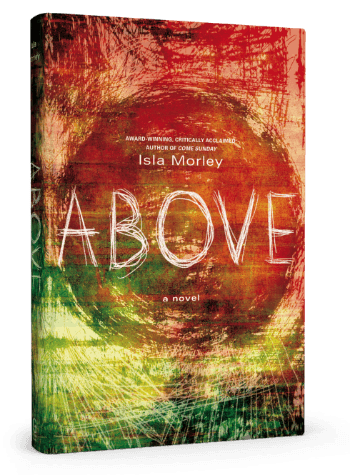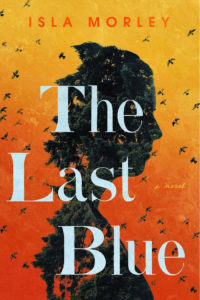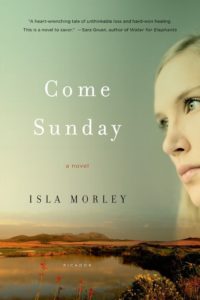As a writer and a reader, I love discovering a new author and then following her career from debut novel into her next books. In the time I’ve been blogging here at the Koala Mom, I’ve had the privilege of watching several authors blossom. Isla Morley is an author whom I discovered with her debut novel, Come Sunday, and have now read her next two novels.
I thoroughly enjoyed her latest novel, The Last Blue. This month, I was delighted to have the opportunity chat with Isla via email about her writing, and to share more about her books with you. Here, Isla Morley talks about the inspiration behind her writing, which is her favourite character, and more!

This post contains affiliate links; as an Amazon associate, I earn from qualifying purchases.
TKM: What inspired you to become an author? Tell us about your journey so far.
Isla Morley: During the worst rainstorm to hit Honolulu in years, I got into bed in a troubled state of mind. I was worried about my husband who’d just had brain surgery after a head injury, I was worried whether our three-year-old daughter would ever really have her dad back, and I was worried about the leaky roof on our garage and how we had no money to fix it.
All of a sudden, I was visited by an imaginary character. (I realize this makes me sound whoo-whoo, but I promise this was the first and last time ever such a thing happened to me.) She appeared beside my bed, staring out the patio door as the storm hammered the island. In her hand was a funeral announcement of her child’s untimely death, and before I could make sense of this, I saw her in a rondavel (a round thatched African hut) a long time after her daughter’s death. A child came to the door requesting her help and I heard her answer, “I can’t right now, but come back tomorrow.”
So compelling was this experience that the next day I started to write about it. Come Sunday was the result. After nearly 15 years, I’m still writing.
TKM: You’ve now written in three very different genres (historical, contemporary, and futuristic). Which is your favourite?
 Isla: Past, present and future are constructs that don’t matter much to me when it comes to writing fiction. The crux of the story is what most engages me. In my books, the time period, like the setting, serves the narrative.
Isla: Past, present and future are constructs that don’t matter much to me when it comes to writing fiction. The crux of the story is what most engages me. In my books, the time period, like the setting, serves the narrative.
For example, The Last Blue had to be historical because it was inspired by real events, and also because Jubilee’s isolation in a wilderness wouldn’t be feasible in a contemporary world.
TKM: Which genre do you think is the most difficult to write?
Isla: Writing historical fiction in some ways is like an actor doing a certain accent for a role. Even a little bit off, a fake accent will detract from the movie. With historical fiction, you have to get the details spot-on or you’re going to lose the authenticity. I suspect historical fiction gets harder to write the farther back in time a story is set.
TKM: Did you visit Appalachia while writing The Last Blue?
Isla Morley: A long time ago my husband and I took a month to travel around the lower half of the US, pitching our tent whenever we got tired of the road, and that region made a deep impression on me. While writing the book, though, I was self-isolating in my little office. I visited eastern Kentucky through books, the Library of Congress and google earth.
TKM: I loved the details about photography in The Last Blue. Is this something you enjoy or something you had to research?
Isla: My first boss was the publisher of a watersports and lifestyle magazine in South Africa. Also a professional photographer, he often took me on photo shoots and taught me the fundamentals of photography. When I showed some level of competence, he assigned me macro shoots of sports equipment, but eventually I was allowed to take scenic and action shots.
Photography in the 30s was quite different to when I first started taking pictures, and I had to research the equipment and technique prevalent at that time. Let Us Now Praise Famous Men is a landmark book of photojournalism by James Agee and Walker Evans, which helped me understand the mission of a documentary photographer of that era, but it also served as a significant inspiration for the two field reporters in The Last Blue.
TKM: What has been your biggest challenge, and how have you overcome it?
Isla: Rejection bites deep. Yes, it’s part of being a writer, and I try to be all que-sera-sera about it, but it strikes right where all my self-doubt resides. Having people who love me and believe in me helps, but what keeps me from quitting is the understanding that making stories is part of my identity now, and if I don’t write, a part of me is going to shrivel up. Overcoming rejection once doesn’t inoculate you, though, does it? You have to overcome it every time it happens.
TKM: How do you develop the characters in The Last Blue?
 Isla Morley: The trick to creating believable characters is to work from the inside out. Understanding their feelings, thoughts, desires and fears will dictate how they behave, and to understand that, I use empathy. I start by imagining how I might feel in the same situation, if I had the same upbringing, the same sense of self-loathing or guilt, or the same naïve hope. Next, subject a character to trials, and they will develop organically – kind of like in real life.
Isla Morley: The trick to creating believable characters is to work from the inside out. Understanding their feelings, thoughts, desires and fears will dictate how they behave, and to understand that, I use empathy. I start by imagining how I might feel in the same situation, if I had the same upbringing, the same sense of self-loathing or guilt, or the same naïve hope. Next, subject a character to trials, and they will develop organically – kind of like in real life.
TKM: Which character from any of your books means the most to you and why?
Isla: In The Last Blue, Jubilee could easily settle into the role of victim and accept her circumstances just for the sake of being safe. Instead, she refuses to be defined by what others think of her. That she risks so much for a sense of self-identity and agency in her world, despite such extreme isolation and hardship, is instructive for me. Also, Jubilee has to figure out where and with whom she belongs, and the issue of belonging is important to me, both because I’m an immigrant and because I found my biological family while writing this book, nearly fifty years after having been adopted.
TKM: Which of your books did you enjoy writing most and why?
Isla: Looking back, Come Sunday was a dream. So many of the passages just kind of poured out. Of all my books, it involved the least amount of rewriting and editing. Huge chunks of the story felt like they were being dictated to me.
TKM: Is there a particular author that has inspired you or your writing?
Isla: Anne Lamott’s book Bird by Bird taught me the most about the creative process of writing. I dip into it often.
TKM: Do you have a specific writing method?
Isla Morley: Why can’t I be that writer who gets up with the sparrows and knocks out two thousand words every day?
My daughter is going off to college in the fall, and I don’t know what excuse I’m going to use after that. I have to clean the litter box? My spam folder needs attention?
Once I’ve started on a book idea, I am more consistent. After coffee with my husband in front of the fireplace or out on the deck, I get to my office around 11ish and work till about 4ish. My only ritual is that I do usually pray, though it’s the clingy desperate kind.
TKM: What part of the writing process do you enjoy the most? Which do you not care for at all?
 Isla: The first draft is where the imagination gets to call the shots. It’s exhilarating to have things drop into your head and shoot down your arm and out your fingers onto the page, and not have any idea where those ideas came from. I enjoy rewriting and editing, and polishing the prose. The last round of edits are the worst because by then I’ve read the manuscript so many times that I don’t know if I’m improving the story or just rearranging the furniture.
Isla: The first draft is where the imagination gets to call the shots. It’s exhilarating to have things drop into your head and shoot down your arm and out your fingers onto the page, and not have any idea where those ideas came from. I enjoy rewriting and editing, and polishing the prose. The last round of edits are the worst because by then I’ve read the manuscript so many times that I don’t know if I’m improving the story or just rearranging the furniture.
TKM: What advice would you give to an author just starting out?
Isla: Do not show your early work to anyone, no matter how exuberant you’re feeling about it. Work on it until it shines, and then let someone read it. After your loved one reads it, find someone who will give you insightful feedback and gentle criticism. Best friends can rarely fulfill this role. You will get feedback that makes you defensive, but take their suggestions to heart, get to work and make it better. New writers are anxious to get published, which leads to their biggest mistake: sending work to agents before it is ready. Rewrite, rewrite, rewrite.
TKM: Do you have another novel in the works, or what is your next project?
Isla: I have a couple of ideas that are in the noodling stage. You know me by now, Bonnie – I’m so secretive about the next thing.
TKM: What’s the story behind the blue boots in your Instagram account?
Isla Morley: Shameful admission here: @blubootz is me procrastinating instead of writing. I thought it would be cool to get a portable writing desk and chair, and go set up in all kinds of places you wouldn’t expect to see a writer. So there I am in a field of blooming wild mustard, on the ferry to Balboa Island, in front of a Los Angeles skyscraper, on the pier at Newport Beach.
I always wear a pair of blue boots. They had to be blue to tie in with my blue-skinned protagonist. And I generally do write something in my notepad, usually something along the lines of, “Sheesh, this is awkward; everyone is looking at me; help, get me out of here!” To go with each photo is a caption about the writing life.
More about Isla Morley
Read my first interview with Isla Morley to find out more about her debut novel, Come Sunday. Pick up Above to read during this time of physical distancing (trust me, Blythe will make you feel better about being “imprisoned” in your home!). Check out my review of The Last Blue or order your copy now!

No Responses Yet